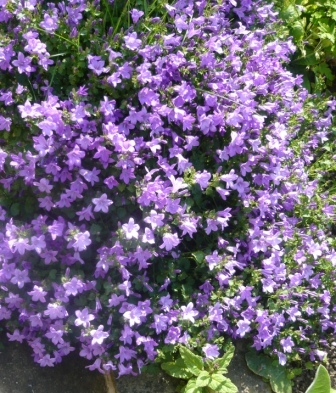Campanula Family for the Rockery
One of the smaller varieties of Campanula should ring a bell for rockery or alpine gardeners. Canterbury Bells have been grown in the UK since the middle ages. The bell shape is created by a cup shaped flower with the edges divided in strips usually creating 5 petals
The bell flowers of Campanula come in many sizes upto 15 foot tall in the case of Campanula pyramidalis grown as a pot plant. The smaller low growing plants are more suitable for the Rockery or Alpine garden. The above example is growing in the space at the top of a low retaining wall and has been there very happily for at least 20 years. These varieties love good drainage.
Campanula Facts and Tips
- The smallest Campanulas hug the ground and throw up flower stalks only a couple of inches. Campanula censia, C. excisa, C. pulla and C. Pusilla fit this category.
- Campanula gargancia despite its name and C. rupestris have clusters of tiny star flowers that hug the ground.
- All the miniature kinds of Campanula are at home in cool, semi-shaded nooks in the lower levels of the rockery.
- Still diminutive in stature Campanula allioni or C. carpathica have larger saucer shaped flowers upto one foot tall.
- Camapanula rotundifolia has blue, white or double forms.
- Tufted and prostrate forms dived with ease in September. Those with errect stems need to be grown from cuttings.
- Campanula barbata is biennial but the low growing C. aucheri is perennial and both have a long tap root that protects them from bad weather conditions.
‘More than 200 Campanula species and hybrids are described, and specialists and collectors will delight in the descriptions of rare and little-documented plants’
Dwarf Campanula by Graham Nichols
Look out for seed of your chosen varieties at special shows or from the Alpine society membership scheme.
Read Growing Campanula and cockleshells on Gardening Tips


3 thoughts on “Campanula Family for the Rockery”
You know, I have just never had great luck with campanula…it is such a lovely flower…but it just never does well in my gardens. sigh.
Comments are closed.